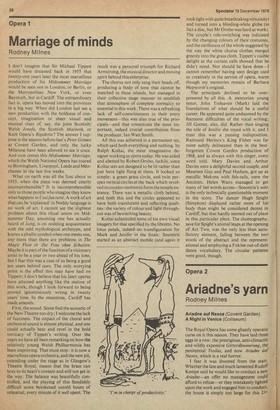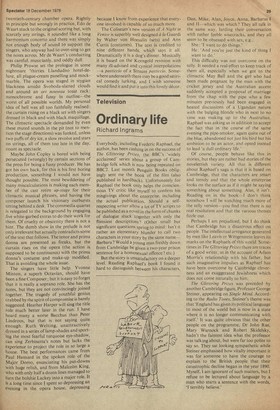Opera 2
Ariadne's yarn
Rodney Milnes
Ariadne auf Naxos (Covent Garden) A Night in Venice (Coliseum)
The Royal Opera has some ghastly operatic curse on it this season. They have laid three eggs in a row: the prestigious, anti-climactic and wildly expensive GOtterdiimmerung, the penitential Troilus, and now Ariadne cud. Naxos, which is a real horror.
I fear it was doomed from the start. Whether the late and much lamented Rudolf Kempe said he would like to conduct a new Ariadne—an offer no management could afford to refuse—or they mistakenly lighted upon the work and engaged him to conduct, the house is simply too large for this Ur twentieth-century chamber opera. Rightly in principle but wrongly in practice. Edo de Waart stuck to the original scoring but, with scarcely any strings, it sounded like a long harmonium concerto and there was simply not enough body of sound to support the singers, who anyway had to over-sing to get the notes across. Mr de Waart's conducting was careful, musicianly, and oddly dull.
Philip Prowse set the prologue in some nightmare 'thirties Llandudno hotel-deluxe, all plague-cream panelling and mockmarble. The opera was staged in stygian blackness amidst Svoboda-slatted clouds and around an art nouveau toast rack : monochrome and fussy in outline--the worst of all possible worlds. My personal idea of hell was all too faithfully realised: the curtain rising on a black set with singers dressed in black and with black maquillage. The climactic spectacle demanded by even these muted sounds in the pit (not to mention the stage directions) was funked, unless two puffs of dry ice, a slow revolve and stars on strings, all of them too late in the day, count as spectacle.
Maybe John Copley is bored with being persecuted (wrongly) by certain sections of the press for being a fussy producer. He has got his own back, for this is his first boring production, something I would not have thought possible. The most bewildering of many miscalculations is making each member of the cast retire up-stage for their climactic musical phrases, and having the composer launch his visionary outbursts sitting behind a desk. The commedia quartet is relegated to the background by engaging five white-garbed extras to do their work for them. Of cruelty or obscenity there is not a hint. The dumb show in the prelude is not only irrelevant but actually contradicts some of the text that follows. The tenor and prima donna are presented as freaks, but the curtain rises on the opera (the action is supposed to be continuous) with the prima donna's costume and make-up modified. That is avoiding the whole issue.
The singers have little help. Yvonne Minton, a superb Octavian, should have been a fine Composer; but it is easy to forget that it is really a soprano role. She has the notes, but they are not convincingly joined together. The tragedy of youthful genius crabbed by the spirit of compromise is barely suggested. Heather Harper will sing the title role much better later in the run. I have heard many a worse Bacchus than Peter Lindroos, but that is not saying quite enough. Ruth Welting, unattractively dressed in a series of lamp-shades and sporting the most fearful turquoise eye-shadow, can sing Zerbinetta's notes but lacks the experience to project the role in so large a house. The best performances came from Paul Hansard in the spoken role of the Major Domo, enunciating his put-downs With huge relish, and from Malcolm King, Who with only half a dozen lines managed to turn the bolshie Lackey into a major role. It Is a long time since I spent so depressing an evening in the opera house, depressing
because I know from experience that everyone involved is capable of so much more.
The Coliseum's new version of A Night in Venice is superbly well designed a la Guardi by Walter von Hoesslin (sets) and Ann Curtis (costumes). The text is credited to nine different hands, which says it all. Dramatically it is a dog's dinner. Musically it is based on the Korngold revision with many ill-advised and cynical interpolations —a pasticcio of a Strauss pasticcio. Somewhere underneath there may be a good satirical comedy lurking, and I wish someone would find it and put it into this lovely decor.















































 Previous page
Previous page